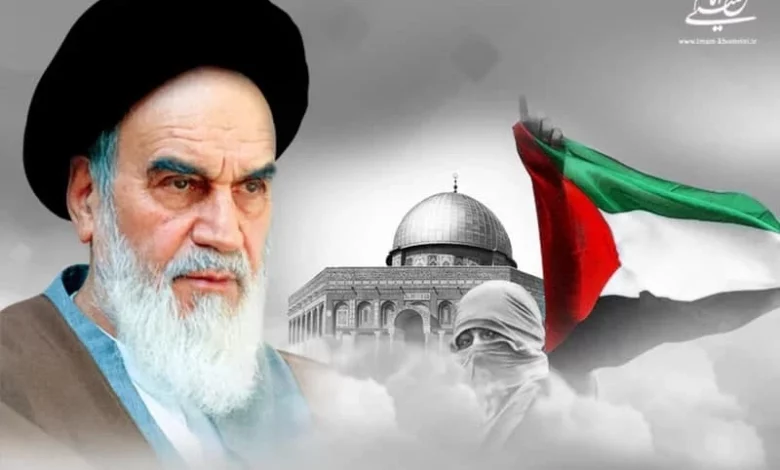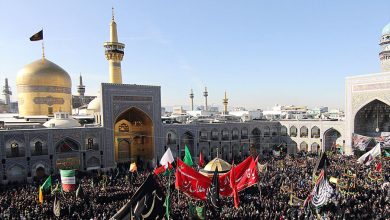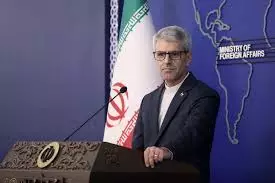36.th ANNIVERSARY: Imam Khomeini’s Vision Sparks Global Resistance Movement
In the serene setting of a mosque in Jamaran, a remote village nestled in the mountains of northern Tehran, Imam Khomeini spoke with a soft, deliberate voice, capturing the undivided attention of his audience.

Observers frequently remarked on the undeniable magnetism of his personality, often expressing a profound sense of awe. This was not merely in response to his words but also to the calm confidence and authoritative presence he projected with such ease.
His softly spoken words resonated worldwide, igniting hope, unsettling authoritarian regimes, and awakening a dormant spirit of resistance in nations under oppression.
Imam Khomeini’s name echoed profoundly on an international scale, leaving an indelible mark across generations. To his followers, he stood as a fatherly figure and the visionary architect behind a global spirit of resistance, following the Islamic Revolution.
From Lebanon to Iraq, Palestine to Nigeria, the legacy of Imam Khomeini continues to resonate globally, encapsulated in a spirit of resistance that persists in challenging oppression, occupation, and imperialism.
At the heart of his ideology lay the principle of advocating for the mustazafin, or the oppressed, in opposition to the mustakbirin, considered the arrogant powers.
This vision has significantly influenced global resistance movements, bolstering their resolve to confront neo-imperialistic and hegemonic forces while asserting their dignity and right to freedom.
**Ayatollah Khamenei Reflects on the Enduring Legacy of Imam Khomeini’s Resistance**
Ayatollah Sayyed Ali Khamenei, recognized as the successor to Imam Khomeini and the Leader of the Islamic Revolution, has consistently emphasized the importance of steadfast resistance as a fundamental principle within his predecessor’s political legacy.
In his address marking the 30th anniversary of Imam Khomeini’s passing in 2019, the Leader of the Islamic Revolution articulated that resistance entails “selecting the appropriate course and embarking on a journey along that course, undeterred by any obstacles.”
Imam Khomeini was characterized by his steadfast dedication to his chosen course, persisting resolutely despite challenges, obstacles, and oppressive regimes. He demonstrated his formidable resilience on the global stage, according to remarks made.
Ayatollah Khamenei articulated that Imam Khomeini’s resistance was rooted in a foundation of logic, faith, and strategic wisdom, rather than being reactionary.
Ayatollah Khamenei emphasized that Imam Khomeini’s decision to pursue a path of resistance was firmly rooted in reason, logic, and knowledge, as well as a deep sense of faith.
Resistance stands as the inherent response of any sovereign and dignified nation when confronted with intimidation and coercion. For nations that hold their dignity, identity, and humanity in high regard, resistance embodies the act of standing firm and refusing to accept imposed conditions.
This steadfast resistance evolved into a national doctrine and gained recognition as a term in international discourse.
Ayatollah Khamenei emphasized that the phrase ‘resistance in the manner of Imam Khomeini’ has become entrenched in international political discourse, particularly after the liberation of Khorramshahr from the West-supported Iraqi Baathist regime.
Lebanon has emerged as a pivotal hub for the resistance axis, demonstrating its strategic significance in regional geopolitical dynamics.
Lebanon’s Hezbollah resistance movement stands as one of the most dedicated proponents of Imam Khomeini’s esteemed legacy. The leaders of the movement have demonstrated a deep personal and ideological allegiance to the founder of the Islamic Revolution and the principles he embodied.
During the summer of 1982, following Israel’s incursion into Lebanon, emerging militants from the fresh ranks of the Lebanese resistance front heeded Imam Khomeini’s rallying cry for defiance. They were steadfast in their belief that combat was essential to challenge the adversary, supported by dominant forces spearheaded by the United States.
Following the conclusion of the Israeli incursion, and amidst the ongoing recovery of Israeli casualties, the region began to see an influx of journalists, recounted Faud Shukr, the senior Hezbollah commander who was later martyred, during an interview discussing the early days of the resistance movement influenced by Imam Khomeini.
Officials reportedly inquired, “Who are you?” to which the response was, “We are the Khomeinists.” One individual appeared confused, stating, “We’ve never heard of that before.” The reply came confidently, “From now on, you will hear it a lot.”
Shukr, a prominent figure within Hezbollah’s military leadership and an emblem of resistance in Lebanon, was assassinated by Israeli forces in July of the previous year.
Sayyed Hassan Nasrallah, who served as the Secretary General of Hezbollah from 1992 until his death in 2024, recounted meaningful interactions with Imam Khomeini.
Nasrallah expressed profound admiration for the Imam, portraying him as more than merely a leader but as a spiritual patriarch whose teachings and presence have deeply influenced the ethos of the Lebanese Islamic resistance movement.
A former secretary general of Hezbollah has revealed that Imam Khomeini regarded the path of resistance as deeply meaningful and promising. A pivotal engagement with the architect of the Islamic Revolution laid the groundwork for the establishment of the Islamic resistance movement in Lebanon, eventually giving rise to Hezbollah.
Sayyed Nasrallah recounted in an interview his encounter with Imam Khomeini, who urged perseverance despite modest capabilities and numbers. Khomeini encouraged reliance on divine support, stating, “Start from scratch… Rely on God Almighty. Do not wait for anyone in the world to help you. Rely on yourselves and know that God Almighty is your supporter. I see that victory is engraved on your foreheads.”
In a recent interview with an Iranian media outlet, Sayyed Nasrallah recounted that approximately two months prior to Imam Khomeini’s passing, the Imam was gravely ill and seldom met with visitors.
With a reassuring smile, he conveyed, “Inform all the Hezbollah members that there is no need for concern. I am with you, and the brothers in the Islamic Republic are equally supportive. We will consistently stand by your side.”
The profound connection between Imam Khomeini and Hezbollah was vividly demonstrated by the widespread mourning that enveloped Lebanon following the passing of the Islamic Revolution’s founder.
According to Sayyed Nasrallah, the sorrow and anguish experienced by the Lebanese people mirrored the profound emotions felt by Iranians.
Sayyed Hashem Safieddine, who previously led Hezbollah’s executive council, instilled Imam Khomeini’s revolutionary principles into the core of the organization. He highlighted that Hezbollah’s identity and strategic approach were fundamentally rooted in the Imam’s vision.
In a recent interview, Safieddine articulated the profound influence of Imam Khomeini on Hezbollah, emphasizing the cultural foundation inspired by the Imam’s path and philosophy. He expressed that a deep-seated respect and admiration for Khomeini is intrinsic to their culture. Reflecting on the emotional and spiritual connection to Khomeini, Safieddine conveyed that his passing marked one of the most somber days of his life, highlighting the sentimental significance the Imam holds for his generation.
On the day the announcement of his passing was made, “time itself seemed to freeze,” according to Safieddin. The streets of Iran were filled with mourners, each overwhelmed with grief. “I felt as though the world had stopped and come to an end,” he reflected.
He highlighted that all accomplishments of the Islamic Republic, along with every triumph of the resistance from Lebanon to the broader Muslim world, have a common origin: Imam Khomeini.
In a recent address marking the 35th anniversary of Imam Khomeini’s passing, Hezbollah Secretary-General Sheikh Naim Qassem emphasized that revolutionary Iran, under Imam Khomeini’s leadership, resolutely supported the resistance front dedicated to the liberation of Palestine and Holy al-Quds.
The late Imam epitomized the principles of faith and stood firmly against injustice, occupation, and subordination. These ideals remain a guiding force for resistance and liberation movements across West Asia, he stated.
**Palestine: A Commitment to Free al-Quds**
In 1968, prior to the Islamic Revolution, Imam Khomeini expressed strong support for the Palestinian cause. As a respected religious figure, he issued a fatwa, urging Muslims to allocate their khums and zakat towards supporting Palestine.
Sayyed Nasrallah emphasized that Imam Khomeini remained steadfast in his dedication to the Palestinian cause, advocating for the full liberation of occupied territories and the dismantling of what he termed an illegitimate regime.
He once stated that the victory of Iran’s Islamic Revolution ignited renewed hope for the future and significantly bolstered the courage and determination of resistance supporters throughout the region.
Following the Islamic Revolution, Imam Khomeini established a formal commitment by designating the last Friday of Ramadan as International Quds Day. This annual observance is intended to keep the issue of Palestine prominently in the consciousness of Muslims globally.
The late Hamas leader Yahya Sinwar once remarked in a speech that Imam Khomeini instituted Quds Day to keep the cause of Palestine vibrant within the Islamic consciousness.
For decades, International Quds Day has become a pivotal event for the Axis of Resistance, strengthening connections among various movements. These include Lebanon’s Hezbollah, Nigeria’s Islamic Movement, Iraq’s Hashd al-Shabi, and Yemen’s Ansarullah, all uniting in their support for al-Quds.
The former political bureau chief of Hamas, Ismail Haniyeh, expressed profound admiration for Imam Khomeini, recalling the pivotal role Khomeini played in making al-Quds a cornerstone of the revolutionary movement and resistance efforts.
In a speech, he paid tribute to Imam Khomeini, noting that the late leader had enshrined al Quds as a cornerstone of revolution and resistance.
Haniyeh highlighted that Imam Khomeini made notable sacrifices for the cause of al-Quds, underscoring his steadfast support for the Palestinian struggle. His dedication helped bring the issue of al-Quds to the forefront of the broader fight against regional oppression and injustice.
Fathi Shaghaghi, a central figure within the Palestinian resistance movement, presented an in-depth analysis of the Palestinian issue through the lens of Imam Khomeini’s philosophy.
In the widely-discussed work “Imam Khomeini (RA), the Alternative Solution,” Shaghaghi delves into the late Imam’s perspective on resistance and liberation, offering it as a unique ideological approach to addressing the Palestinian issue.
His contributions have been extensively acknowledged for their insightful examination of alternative strategies grounded in the teachings of Imam Khomeini, playing a crucial role in the intellectual dialogue regarding the pursuit of justice in Palestine.
**Inspiration Fueling the Iraqi Resistance Movement**
The ideological legacy of Imam Khomeini, stemming from the 1979 Islamic Revolution in Iran, played a pivotal role in shaping the Iraqi resistance movement.
His vision of an Islamic governance system and steadfast opposition to oppression galvanized different Iraqi factions to unite against Saddam Hussein’s Ba’athist regime and subsequently the US-led occupation.
Imam Khomeini’s focus on advocating for the oppressed and maintaining Islamic identity established the foundational ideology for the Iraqi resistance. This movement was instrumental during the 2003 U.S. invasion and in the subsequent dismantling of the Daesh Takfiri terrorist group.
The former deputy leader of Iraq’s Popular Mobilization Units (PMU), Mahdi al-Muhandis, previously remarked that Imam Khomeini was instrumental in sparking the spirit of resistance within the Islamic Ummah and serves as a guiding figure in the collective struggle against oppression and occupation.
In a 2017 interview with an Iranian media outlet, al-Muhandis expressed his allegiance, stating his role as “a soldier of the Islamic Revolution under the leadership of Imam Khomeini.”
Qais al-Khazali, the secretary-general of the Iraqi resistance faction Asa’ib Ahl al-Haq, which is affiliated with the Popular Mobilization Units (PMU), expressed analogous views, stating, “The teachings of Imam Khomeini constitute a doctrine of resistance and self-sacrifice, inspiring our resolve to pursue the struggle against oppression.”
Hadi al-Amiri, who leads Iraq’s Fatah Alliance in parliament and heads the Badr Organization, credited Imam Khomeini for fostering a spirit of resistance.
Imam Khomeini reinstated dignity and honor within the Islamic Ummah, emphasizing that capitulation is not a choice for the devout.
Yemen: A Beacon of Hope for the Oppressed
In Yemen, the influence of Imam Khomeini’s teachings is evident in the speeches and determination demonstrated by the leaders and fighters of Ansarullah.
Abdul-Malik al-Houthi, head of the Ansarullah resistance movement, frequently attributes the resilience and spirit of the group to the influence of Iran’s Islamic Revolution and the leadership of Imam Khomeini.
Al-Houthi has consistently referenced the principles of Imam Khomeini, advocating for independence, justice, and solidarity among the oppressed within the Islamic world.
In their discourses and addresses, leaders of Ansarullah portray their fight as an extension of the Islamic awakening sparked by the 1979 Islamic Revolution.
Al-Houthi, in a recent speech, highlighted Imam Khomeini’s vision of the Islamic Revolution as a unifying force for the Ummah, emphasizing that his cultural legacy continues to be a pivotal element in the battle against global arrogance.
He depicts the Islamic Revolution under the leadership of Imam Khomeini as a crucial catalyst in the continued fight against injustice and foreign dominance.
Al-Houthi frequently emphasizes Imam Khomeini’s founding of al Quds Day as an essential tool for maintaining the prominence of the Palestinian cause within the consciousness of Muslims globally.
The Ansarullah resistance movement has unequivocally affirmed its dedication to advocating for the Palestinian cause. This includes contesting the severe actions taken by the Israeli regime in Gaza, which they characterize as genocidal. In alignment with their stance, the movement has been conducting regular military operations within the occupied territories.
The resistance movement has been actively engaging in military operations in accordance with this perspective. This dedication is firmly embedded in the ideological principles influenced by Imam Khomeini, highlighting resistance against oppression and occupation. This aligns their actions closely with the revolutionary ideals advocated by the architect of the Islamic Revolution.
**Nigeria: The Influence of the Islamic Revolution on the African Continent**
In Nigeria, a nascent revolution began to quietly unfold following the 1979 Islamic Revolution in Iran. During the early 1980s, Sheikh Ibrahim Zakzaky, a young cleric from Zaria in northern Nigeria, was inspired by the works of Imam Khomeini, which ignited a revolutionary fervor within him.
Zakzaky remarked that “the light of Imam Khomeini has reached Nigeria,” indicating that the revolution inspired by the late Iranian leader has emboldened their resolve to resist oppression.
Drawing inspiration from Iran’s Islamic Revolution, Zakzaky established the Islamic Movement in Nigeria (IMN), challenging the repressive state apparatus in the nation. Despite facing multiple imprisonments, witnessing the massacre of his followers, and enduring the martyrdom of his sons, he remained resolute in upholding the ideals imparted by Imam Khomeini.
Zakzaky emphasized that genuine independence is attained through a combination of faith, revolutionary action, and steadfast resistance.
An African leader has expressed his commitment to the teachings of Imam Khomeini, stating that he and his movement have introduced these principles to the citizens in the nation, adopting Khomeini’s approach as a guiding framework.
Zakzaky underscored his stance by stating, “Our approach is in alignment with the teachings of Imam Khomeini, who demonstrated that resisting imperialism and attaining genuine independence is achievable through faith and revolutionary action.”
Thirty-six years after his demise, Imam Khomeini endures as a central figure of inspiration for oppressed communities globally. His revolutionary legacy persists as a beacon, infusing vitality into the ongoing fight for justice and dignity.







